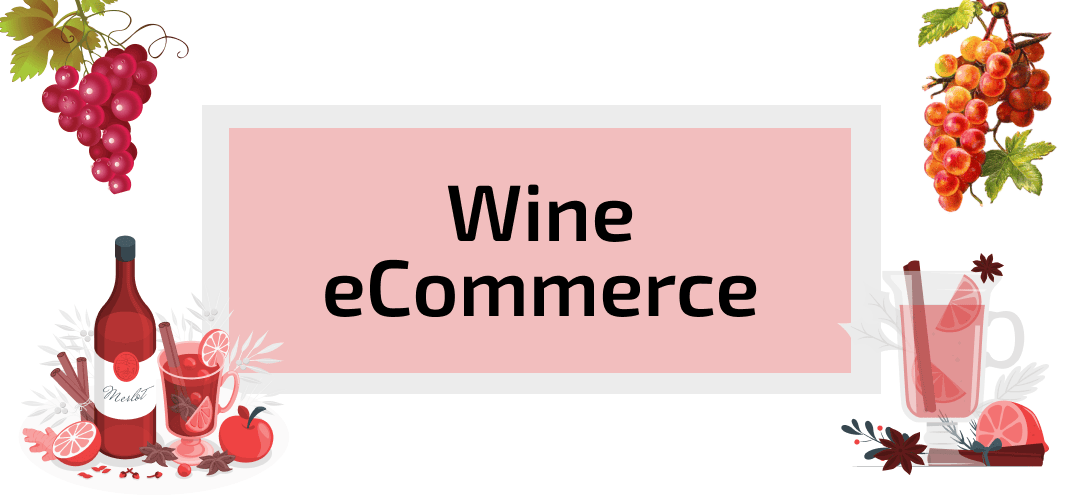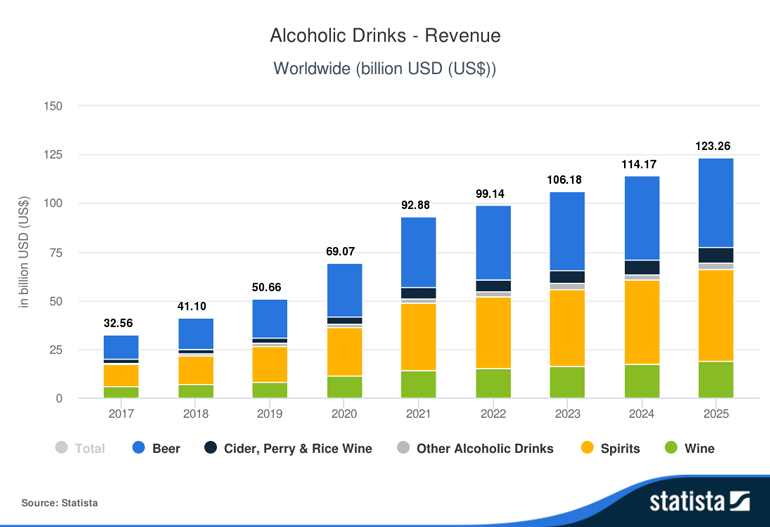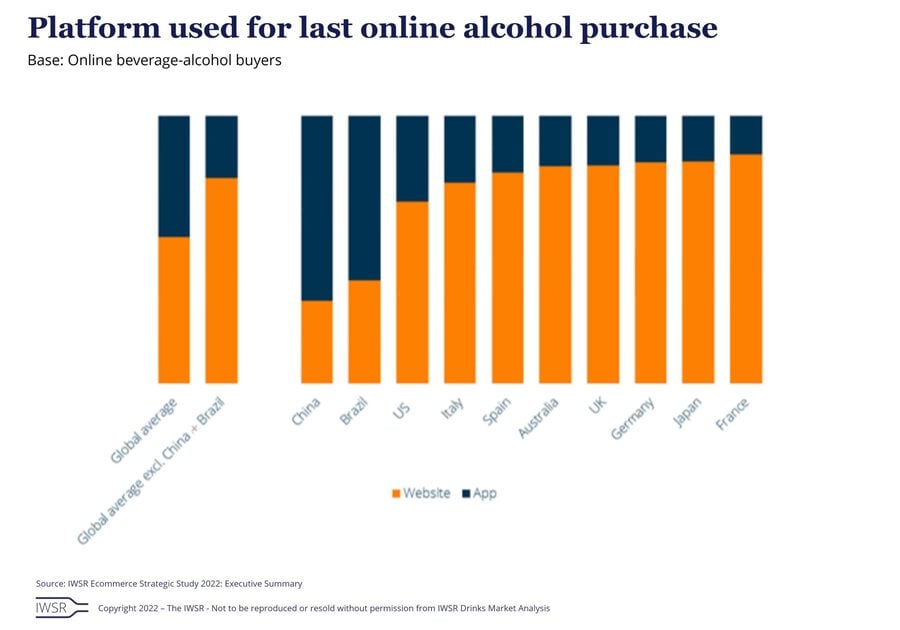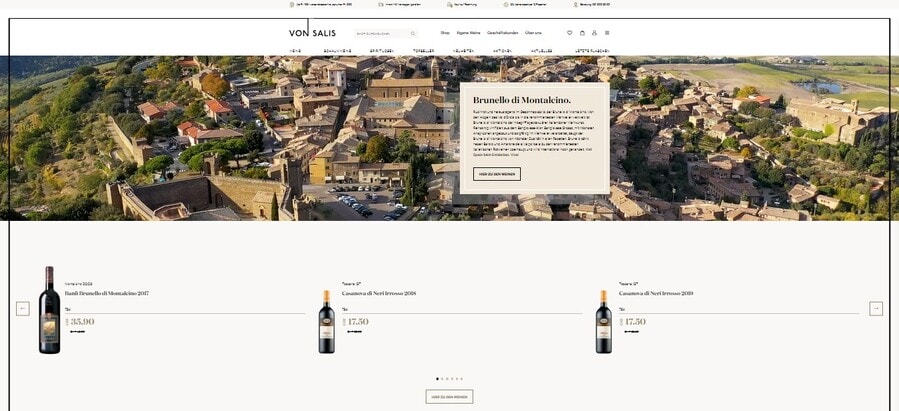
When it comes to exploiting the potential of digital and online sales, the food and beverage eCommerce sector has found its sweet spot. With more online supermarkets entering the market and gaining success, it seems only natural that wineries will follow suit.
According to the Wine Intelligence Wine E-commerce 2022 report, wine eCommerce is expected to grow by 7.7% each year. Across 13 largest markets, four out of every ten consumers buy wine online. A quarter of respondents said they did not make such online purchases but would think about it.
Setting up an online store on an eCommerce platform allows wineries, wine manufacturers and wine distributors to take advantage of this trend, increase sales, and expand their customer base.
Here, you’ll learn why wine is a popular direct-to-consumer trend, how to overcome some industry’s restrictions like compliance and taxation, and what eCommerce platform to choose for digitizing wine business (plus, a success story from winery brands that have already gone online and benefited from it).
4 most common challenges in selling wine online
Given significant obstacles on the way to success, it is not surprising that companies in the wine industry are implementing wine eCommerce quite slowly. To cut this timeline, let's first examine the challenges setting these enterprises back.
Poor search & thin content don’t promote sales
When customers visit your website, they should know what to look for. This is made possible by creating a comprehensive and understandable product taxonomy (how you classify products). A decent search or browsing experience is facilitated by accurate wine descriptions (such as country, region, type, grape variety, designation, etc.).
Pre-loaded information, including reviews, ratings, drinking dates and other non-standard categorizations, lessens the administrative burden of regularly updating and renewing content. Product definitions and rich information can improve search engine results, especially if content changes alongside products in your web shop.
Producer profiles, personal comments, professional recommendations, drinking tips, bottle shots, label photographs, and product tags also enhance the user experience and support purchasing decisions.

All-eggs-in-one-basket vs omnichannel
Online wine business should be a part of a larger channel strategy. Consolidating all operations into a single system allows to meet the demands of any sales or marketing channels, and guarantee that your stock level is accurate at every page and at all times.
Due to the importance of connections and expertise in this market, wine sellers almost always use many channels, including online, over the phone or via email. You can decide which wine to sell via which channel, and differentiate pricing per channel to manage margin.
Stock management and fulfillment flexibility
Wine warehouses, shipments and movements, purchases and sales orders are all handled by a business management system. So mastering inventory will ensure a precise and current positioning of wines being sold on your eCommerce website.
For the real-time updating of all stock positions, a single point of control is necessary so that it is clear which wines are immediately deliverable and which will be shipped at a later date. The characteristics of the stock might vary depending on the types you are selling.
The sale of wines is complicated by delivery options, associated fees and various taxes. The most striking example is working in different jurisdictions. For instance, state-by-state differences in alcohol laws and regulations in the USA restrict the transportation of wine to consumers and exacerbate logistical difficulties.
With these regulatory restrictions, additional factors like temperature control specifications, and the rising demand for next-day and same-day delivery, managing order fulfillment online becomes even more challenging. Due to the requirement for ID verification, the last mile of delivery is a particularly difficult barrier for businesses across all sectors.
Customer engagement & retention
Building trust with your clients and maintaining the quality of your offering over time are additional factors that contribute to a successful eCommerce business.
Beyond simple cross-selling possibilities, more complex winery sales solutions offer insights into the preferences of your consumers to boost sales and conversions. By suggesting other products, they offer an online shopping experience comparable to that of a physical store.
Your customers will expect to see precise information, including their favorites and wishing lists, payment methods, and the wines they are currently storing in addition to their history of online and offline purchases.
Recognizing the role of customer relationship management, you should also integrate your system with cellar management. This covers the wines your customers store, and some retailers extend use to home cellar management to give a 360° view of collections.
What to look for in a wine eCommerce platform?
To face all the challenges, streamline the inner processes and don’t overpay for surplus functions, you’ll need a flexible and reliable winery eCommerce platform. But what is must-have functionality and what can be omitted? To make it easier for you, we've examined the key characteristics your software should have to sell wine online.

Obviously, there are specific features necessary to promote wine sales, for example, wine memberships, wine allocations or extended inventory management, but there are also more general requirements that you won’t do without (or will pay a lot of money for custom development). Here’s our ultimate list:
- Beautiful and informative storefront. For online spirits sales, your homepage serves as a virtual welcome mat. And aesthetic first impressions are particularly crucial for such goods like wine so opt for a platform with an extended templates collection or enough flexibility to create any design to your liking. An intuitive and navigable structure is another feature that will help build a successful customer journey – robust classification and categorization should be enabled by clear inner platform settings.
- A+ consumer experience. Reduce the time your consumers spend on the website searching for the necessary products and instead increase their retention rate, making them your regular clients. For that, add smart filters to browse through available products and find the rarest items in a few clicks. By answering the most common pre-sales questions, you can increase the number of sales – write FAQs for products and your store on the whole. Make it simple for customers to check their current order status, set up push notifications and chatbots. Create a mobile app for your store in addition to a mobile-friendly website.
- Multi-store management. A multi-store feature is used to launch multiple web stores for multi-segment targeting, international brand separation, advanced vineyard inventory management or store expansion. This approach allows running a single codebase, buying a single license and controlling all business branches from the same admin panel.
- Fast and secure checkout experience. The best ecommerce platforms ensure security and offer a number of payment gateways. Anonymous checkout and online checkout improves your website’s conversion rate by removing any friction and attracting repeat customers who had a great experience the first time they bought from you.
- SEO for wine merchants. Even a good wine marketing strategy can be limited by eCommerce platform features. To rank higher and drive organic traffic to your website, you need a platform that supports SEO-friendly URLs, a well-organized structure, reliable security protocols and tools to ensure optimal page speed.
- Auto email campaigns. In addition to built-in marketing tools, effective wine sales software integrates with email marketing tools. Email marketing automation is a powerful customer retention tool for online retailers. This digital channel generates the highest ROI, giving businesses the opportunity to engage customers and create income through future sales and email promotions.
- Coupons, gift certificates, and promos. Offering great deals and fantastic discounts with promo codes will help you retain customers through a checkout process. A well-thought-out loyalty program will win your regular clients and increase an average receipt amount. The eCommerce platform you choose should have flexible settings for making special offers for various customer roles.
Want to find an eCommerce platform that meets all these requirements, yet is easy to customize and doesn’t require much money and effort to maintain? Look no further! nopCommerce is a perfect wine eCommerce platform (as well as a robust solution for other business spheres). The software combines logistics, inventory, vineyard accounting, marketing and many other features for selling both perishable and imperishable food and beverages online.
In vino veritas: successful examples of wine eCommerce
There is a common question of “How to start a wine business?” but it’s not less important to digitize and update it once the time comes.
Since wine drinking customs and culture have a special impact on consumers’ decisions, and wine consumers have specific demands, a wine eCommerce website should share the brand’s history and urge visitors to join the community.
For a little inspiration, here are two wine eCommerce websites built with the customer experience in mind: Salis and Valentin Wine.

The trick was to make an all-in-one selling platform for B2B (restaurateurs) and B2C (private customers). The marketing department's innovative ideas should be supported by a flexible CMS. To improve internal processes, lessen error-prone areas and boost productivity, the best solution was to integrate the chosen eCommerce system with ERP.
Thanks to rich nopCommerce features and capabilities, the store owners get a chance to interact with their ERP directly, without having to adjust the back office of nopCommerce. With ERP and nopCommerce synchronized, the prices and discounts can be set for each client despite the incredibly intricate and highly individualized price structures that have developed over time.
Stock levels are shown and updated in real-time from all points of sale and online channels, and shipment tracking is seamlessly linked. Overall, the two websites are a secure investment with a wide range of features, a high level of automation, and the ability to add new services in the future. Learn more about what nopCommerce can do for wine eCommerce websites in our partner’s case study.
Conclusion
It’s reported that online wine sales are steadily growing each year. Wineries and independent vendors that want to expand their customer base and obtain new channels need a strong internet presence, but there is no one-size-fits-all option.
With alcohol being one of the most regulated products, it doesn't mean that you cannot beat the wine eCommerce market using a well-thought strategy, effective marketing and powerful software to keep it all together.
A well-considered approach to structural and operational processes is an absolutely necessary condition for success, and the underlying platform must be adaptable enough to handle all varieties of wine and be set up to provide the best-in-class eCommerce experience.
FAQ on winery eCommerce
Q: Are there any restrictions to selling wine online?
A: Both private sellers and wineries are allowed to sell wine online using eCommerce platforms or marketplaces as long as they follow their state’s laws and regulations. Depending on the county in which they operate, wineries must get a number of permits like “Alcohol Dealer Registration”, “State’s Winery License” and “Shipper’s License”.
It's not a given that you can sell online just because you can sell locally. For example, online wine sales are legal in the USA, but the laws and regulations governing the shipment of wine vary from state to state. Some states have restrictions on the types of wines that can be shipped and demand special licenses.
Q: How to sell wine online internationally?
A: To make sure the shipment is accepted by customs at the destination, carriers ask merchants to provide a permit or license for importers, a "quality certificate" for wine, and a list of manufacturing processes and an analysis of the ingredients.
Wineries are allowed to sell wine overseas as long as they follow the nation's rules. For example, some European countries demand an excise license or bond form. Wines are shipped globally for authorized sellers by UPS, DHL and FedEx.
To sell wine online in other countries, keep in mind that you must examine all the legal aspects and shipping costs of the eCommerce platform you’re going to use.